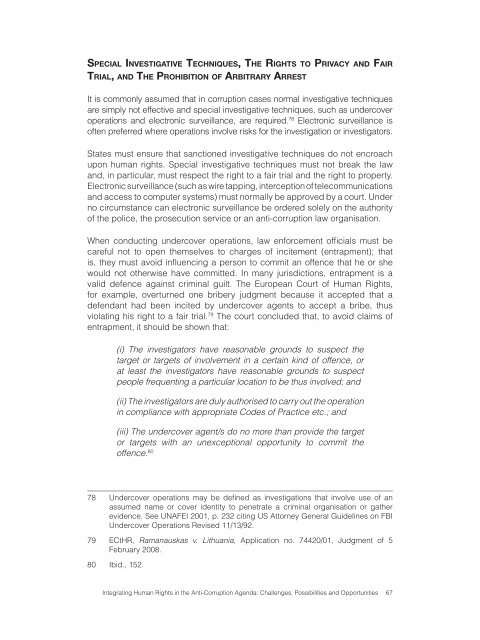Integrating Human Rights in the Anti-Corruption Agenda - The ICHRP
Integrating Human Rights in the Anti-Corruption Agenda - The ICHRP
Integrating Human Rights in the Anti-Corruption Agenda - The ICHRP
Create successful ePaper yourself
Turn your PDF publications into a flip-book with our unique Google optimized e-Paper software.
Special Investigative Techniques, <strong>The</strong> <strong>Rights</strong> to Privacy and Fair<br />
Trial, and <strong>The</strong> Prohibition of Arbitrary Arrest<br />
It is commonly assumed that <strong>in</strong> corruption cases normal <strong>in</strong>vestigative techniques<br />
are simply not effective and special <strong>in</strong>vestigative techniques, such as undercover<br />
operations and electronic surveillance, are required. 78 Electronic surveillance is<br />
often preferred where operations <strong>in</strong>volve risks for <strong>the</strong> <strong>in</strong>vestigation or <strong>in</strong>vestigators.<br />
States must ensure that sanctioned <strong>in</strong>vestigative techniques do not encroach<br />
upon human rights. Special <strong>in</strong>vestigative techniques must not break <strong>the</strong> law<br />
and, <strong>in</strong> particular, must respect <strong>the</strong> right to a fair trial and <strong>the</strong> right to property.<br />
Electronic surveillance (such as wire tapp<strong>in</strong>g, <strong>in</strong>terception of telecommunications<br />
and access to computer systems) must normally be approved by a court. Under<br />
no circumstance can electronic surveillance be ordered solely on <strong>the</strong> authority<br />
of <strong>the</strong> police, <strong>the</strong> prosecution service or an anti-corruption law organisation.<br />
When conduct<strong>in</strong>g undercover operations, law enforcement officials must be<br />
careful not to open <strong>the</strong>mselves to charges of <strong>in</strong>citement (entrapment); that<br />
is, <strong>the</strong>y must avoid <strong>in</strong>fluenc<strong>in</strong>g a person to commit an offence that he or she<br />
would not o<strong>the</strong>rwise have committed. In many jurisdictions, entrapment is a<br />
valid defence aga<strong>in</strong>st crim<strong>in</strong>al guilt. <strong>The</strong> European Court of <strong>Human</strong> <strong>Rights</strong>,<br />
for example, overturned one bribery judgment because it accepted that a<br />
defendant had been <strong>in</strong>cited by undercover agents to accept a bribe, thus<br />
violat<strong>in</strong>g his right to a fair trial. 79 <strong>The</strong> court concluded that, to avoid claims of<br />
entrapment, it should be shown that:<br />
(i) <strong>The</strong> <strong>in</strong>vestigators have reasonable grounds to suspect <strong>the</strong><br />
target or targets of <strong>in</strong>volvement <strong>in</strong> a certa<strong>in</strong> k<strong>in</strong>d of offence, or<br />
at least <strong>the</strong> <strong>in</strong>vestigators have reasonable grounds to suspect<br />
people frequent<strong>in</strong>g a particular location to be thus <strong>in</strong>volved; and<br />
(ii) <strong>The</strong> <strong>in</strong>vestigators are duly authorised to carry out <strong>the</strong> operation<br />
<strong>in</strong> compliance with appropriate Codes of Practice etc.; and<br />
(iii) <strong>The</strong> undercover agent/s do no more than provide <strong>the</strong> target<br />
or targets with an unexceptional opportunity to commit <strong>the</strong><br />
offence. 80<br />
78 Undercover operations may be def<strong>in</strong>ed as <strong>in</strong>vestigations that <strong>in</strong>volve use of an<br />
assumed name or cover identity to penetrate a crim<strong>in</strong>al organisation or ga<strong>the</strong>r<br />
evidence. See UNAFEI 2001, p. 232 cit<strong>in</strong>g US Attorney General Guidel<strong>in</strong>es on FBI<br />
Undercover Operations Revised 11/13/92.<br />
79 ECtHR, Ramanauskas v. Lithuania, Application no. 74420/01, Judgment of 5<br />
February 2008.<br />
80 Ibid., 152.<br />
<strong>Integrat<strong>in</strong>g</strong> <strong>Human</strong> <strong>Rights</strong> <strong>in</strong> <strong>the</strong> <strong>Anti</strong>-<strong>Corruption</strong> <strong>Agenda</strong>: Challenges, Possibilities and Opportunities 67

















